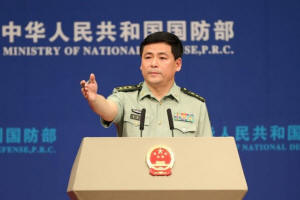|
Both countries have worked hard to improve interaction between
their militaries to avoid any miscalculations in areas like the
South China Sea where both regularly fly military aircraft and
sail warships.
But there is deep mistrust, with Beijing having been angered by
what it views as provocative U.S. military flights and naval
patrols in the disputed East China Sea and South China Sea, and
suspicious of close U.S. defense ties with South Korea, Japan,
Taiwan and increasingly India.
U.S. Secretary of State Rex Tillerson said last week that
Washington saw room to invite others, including Australia, to
join U.S.-India-Japan security cooperation, something Beijing
has opposed as an attempt by democracies to gang up on it.
Speaking at a monthly news briefing, Chinese Defense Ministry
spokesman Ren Guoqiang said it was happy to see positive
developments in military relations with the United States that
both countries leaders attached importance to.
"Looking to the future, we are willing to work with the U.S.
side to respect each other, deepen mutual trust, focus on
practical exchanges and cooperation and appropriately manage and
control disputes, to continue injecting positive energy in the
development of ties," Ren added.
China, a strategic rival to the United States and India, is also
vital to Trump's efforts to roll back North Korea's efforts to
create nuclear-armed missiles capable of reaching the United
States, an issue expected to top the agenda in Trump's Nov. 8-10
Beijing visit.
(Reporting by Ben Blanchard; Editing by Nick Macfie)
[© 2017 Thomson Reuters. All rights
reserved.] Copyright 2017 Reuters. All rights reserved. This material may not be published,
broadcast, rewritten or redistributed.
 |
|






